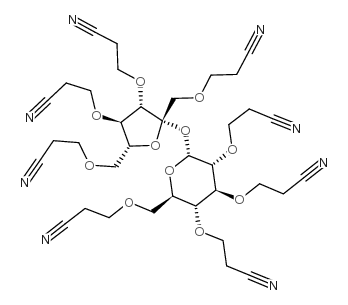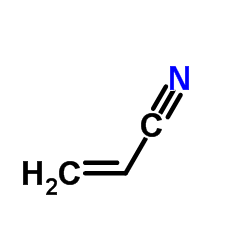18304-13-7
| 中文名 | 八(O-氰基乙基)蔗糖 |
|---|---|
| 英文名 | cyanoethyl sucrose |
| 英文别名 |
Octa-(O-cyanoethyl)sucrose
octakis-O-(2-cyanoethyl)sucrose EINECS 242-187-3 1',2,3,3',4',6'-Octa-O-(2-cyanoethyl)sucrose 3,4,6-tetrakis-o-(2-cyanoethyl)-osyl |
| 密度 | 1.28 g/cm3 |
|---|---|
| 沸点 | 1040.5ºC at 760 mmHg |
| 熔点 | -10ºC |
| 分子式 | C36H46N8O11 |
| 分子量 | 766.79700 |
| 闪点 | 318.9ºC |
| 精确质量 | 766.32900 |
| PSA | 291.85000 |
| LogP | 2.10824 |
| 外观性状 | 黏的液体液体 |
| 蒸汽压 | 0mmHg at 25°C |
| 折射率 | 1.483-1.485 |
| 分子结构 | 1、 摩尔折射率:183.20 2、 摩尔体积(m3/mol):596.2 3、 等张比容(90.2K):1692.1 4、 表面张力(dyne/cm):64.8 5、 极化率(10-24cm3):72.62 |
| 计算化学 | 1、 疏水参数计算参考值(XlogP):-4.5 2、 氢键供体数量:0 3、 氢键受体数量:19 4、 可旋转化学键数量:29 5、 拓扑分子极性表面积(TPSA):292 6、 重原子数量:55 7、 表面电荷:0 8、 复杂度:1560 9、 同位素原子数量:0 10、 确定原子立构中心数量:9 11、 不确定原子立构中心数量:0 12、 确定化学键立构中心数量:0 13、 不确定化学键立构中心数量:0 14、 共价键单元数量:1 |
| 更多 | 1. 性状:不确定 2. 密度(g/mL,25/4℃):1.2 3. 相对蒸汽密度(g/mL,空气=1):不确定 4. 熔点(ºC):不确定 5. 沸点(ºC,常压):不确定 6. 沸点(ºC, 5.2kPa):不确定 7. 折射率:1.483-1.485 8. 闪点(ºC):不确定 9. 比旋光度(º):不确定 10. 自燃点或引燃温度(ºC):不确定 11. 蒸气压(kPa,25ºC):不确定 12. 饱和蒸气压(kPa,60ºC):不确定 13. 燃烧热(KJ/mol):不确定 14. 临界温度(ºC):不确定 15. 临界压力(KPa):不确定 16. 油水(辛醇/水)分配系数的对数值:不确定 17. 爆炸上限(%,V/V):不确定 18. 爆炸下限(%,V/V):不确定 19. 溶解性:不确定 |
Synonym: Section 2 - COMPOSITION, INFORMATION ON INGREDIENTS
Risk Phrases: None Listed. Section 3 - HAZARDS IDENTIFICATION EMERGENCY OVERVIEW
The toxicological properties of this material have not been fully investigated. Potential Health Effects Eye: No information regarding eye irritation and other potential effects was found. Skin: No information regarding skin irritation and other potential effects was found. Ingestion: The toxicological properties of this substance have not been fully investigated. Inhalation: The toxicological properties of this substance have not been fully investigated. Chronic: No information found. Section 4 - FIRST AID MEASURES Eyes: Flush eyes with plenty of water for at least 15 minutes, occasionally lifting the upper and lower eyelids. Get medical aid immediately. Skin: Get medical aid. Flush skin with plenty of water for at least 15 minutes while removing contaminated clothing and shoes. Ingestion: If victim is conscious and alert, give 2-4 cupfuls of milk or water. Never give anything by mouth to an unconscious person. Get medical aid immediately. Inhalation: Remove from exposure and move to fresh air immediately. If not breathing, give artificial respiration. If breathing is difficult, give oxygen. Get medical aid. Notes to Physician: Section 5 - FIRE FIGHTING MEASURES General Information: As in any fire, wear a self-contained breathing apparatus in pressure-demand, MSHA/NIOSH (approved or equivalent), and full protective gear. During a fire, irritating and highly toxic gases may be generated by thermal decomposition or combustion. Extinguishing Media: Use agent most appropriate to extinguish fire. Section 6 - ACCIDENTAL RELEASE MEASURES General Information: Use proper personal protective equipment as indicated in Section 8. Spills/Leaks: Clean up spills immediately, observing precautions in the Protective Equipment section. Sweep up or absorb material, then place into a suitable clean, dry, closed container for disposal. Provide ventilation. Section 7 - HANDLING and STORAGE Handling: Wash thoroughly after handling. Remove contaminated clothing and wash before reuse. Use with adequate ventilation. Avoid contact with eyes, skin, and clothing. Keep container tightly closed. Avoid ingestion and inhalation. Storage: Keep container closed when not in use. Store in a tightly closed container. Store in a cool, dry, well-ventilated area away from incompatible substances. Section 8 - EXPOSURE CONTROLS, PERSONAL PROTECTION Engineering Controls: Use adequate ventilation to keep airborne concentrations low. Exposure Limits CAS# 18304-13-7: Personal Protective Equipment Eyes: Wear appropriate protective eyeglasses or chemical safety goggles as described by OSHA's eye and face protection regulations in 29 CFR 1910.133 or European Standard EN166. Skin: Wear appropriate protective gloves to prevent skin exposure. Clothing: Wear appropriate protective clothing to prevent skin exposure. Respirators: Follow the OSHA respirator regulations found in 29 CFR 1910.134 or European Standard EN 149. Use a NIOSH/MSHA or European Standard EN 149 approved respirator if exposure limits are exceeded or if irritation or other symptoms are experienced. Section 9 - PHYSICAL AND CHEMICAL PROPERTIES Physical State: Liquid Color: clear viscous Odor: Not available. pH: Not available. Vapor Pressure: Not available. Viscosity: Not available. Boiling Point: > 300 deg C Freezing/Melting Point: -10 deg C Autoignition Temperature: Not available. Flash Point: > 180 deg C (> 356.00 deg F) Explosion Limits, lower: Not available. Explosion Limits, upper: Not available. Decomposition Temperature: Solubility in water: Specific Gravity/Density: 1.2000g/cm3 Molecular Formula: C12H14(OH)(OCH2H4) Molecular Weight: Section 10 - STABILITY AND REACTIVITY Chemical Stability: Stable under normal temperatures and pressures. Conditions to Avoid: Incompatible materials, strong oxidants. Incompatibilities with Other Materials: Oxidizing agents. Hazardous Decomposition Products: Irritating and toxic fumes and gases. Hazardous Polymerization: Has not been reported Section 11 - TOXICOLOGICAL INFORMATION RTECS#: CAS# 18304-13-7 unlisted. LD50/LC50: Not available. Carcinogenicity: Cyanoethyl sucrose - Not listed by ACGIH, IARC, or NTP. Section 12 - ECOLOGICAL INFORMATION Section 13 - DISPOSAL CONSIDERATIONS Dispose of in a manner consistent with federal, state, and local regulations. Section 14 - TRANSPORT INFORMATION IATA Not regulated as a hazardous material. IMO Not regulated as a hazardous material. RID/ADR Not regulated as a hazardous material. Section 15 - REGULATORY INFORMATION European/International Regulations European Labeling in Accordance with EC Directives Hazard Symbols: Not available. Risk Phrases: Safety Phrases: S 24/25 Avoid contact with skin and eyes. S 28A After contact with skin, wash immediately with plenty of water. S 37 Wear suitable gloves. S 45 In case of accident or if you feel unwell, seek medical advice immediately (show the label where possible). WGK (Water Danger/Protection) CAS# 18304-13-7: No information available. Canada CAS# 18304-13-7 is listed on Canada's DSL List. CAS# 18304-13-7 is not listed on Canada's Ingredient Disclosure List. US FEDERAL TSCA CAS# 18304-13-7 is listed on the TSCA inventory. SECTION 16 - ADDITIONAL INFORMATION N/A |
| 安全声明 (欧洲) | S24/25 |
|---|
|
~69% 
18304-13-7 |
| 文献:Bazin, Helene; Bouchu, Alain; Descotes, Gerard Journal of Carbohydrate Chemistry, 1995 , vol. 14, # 8 p. 1187 - 1208 |


